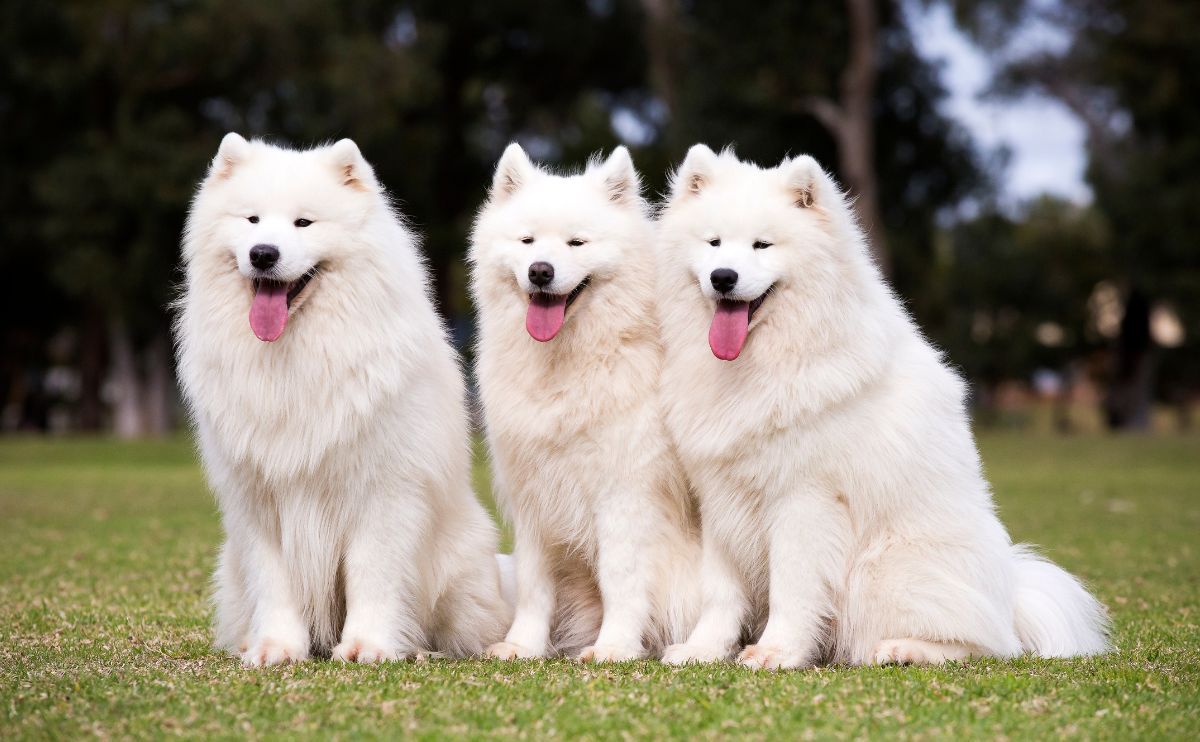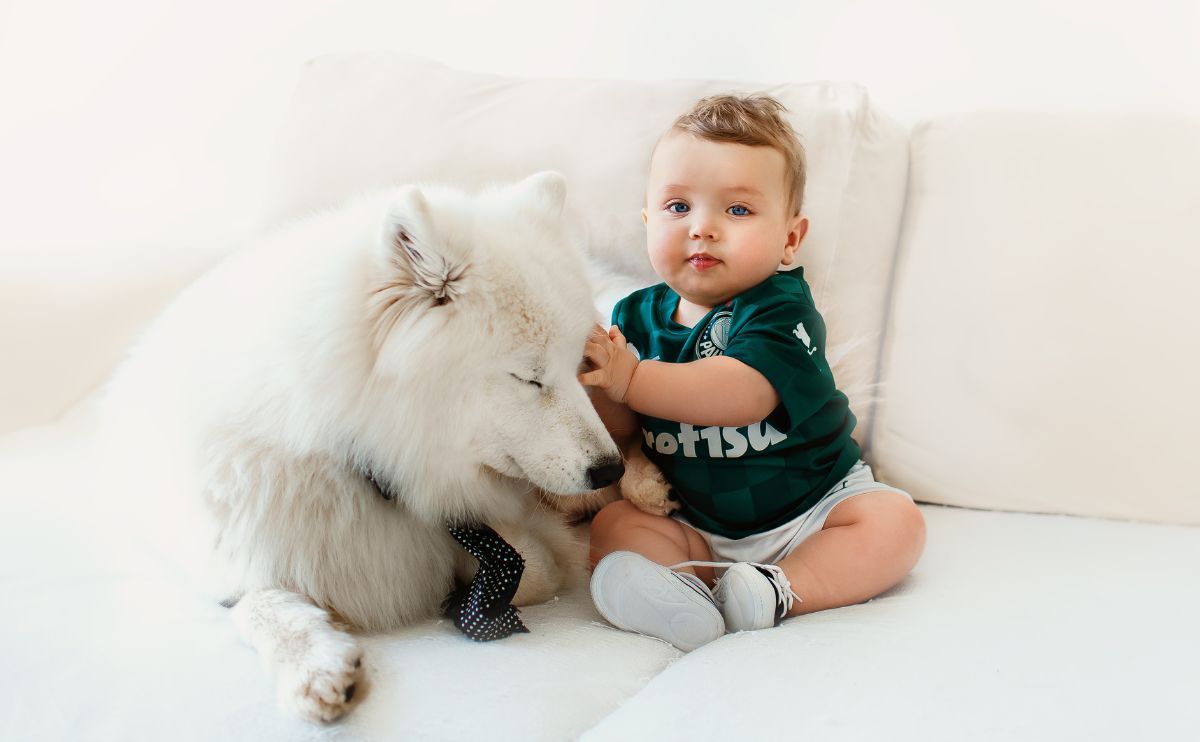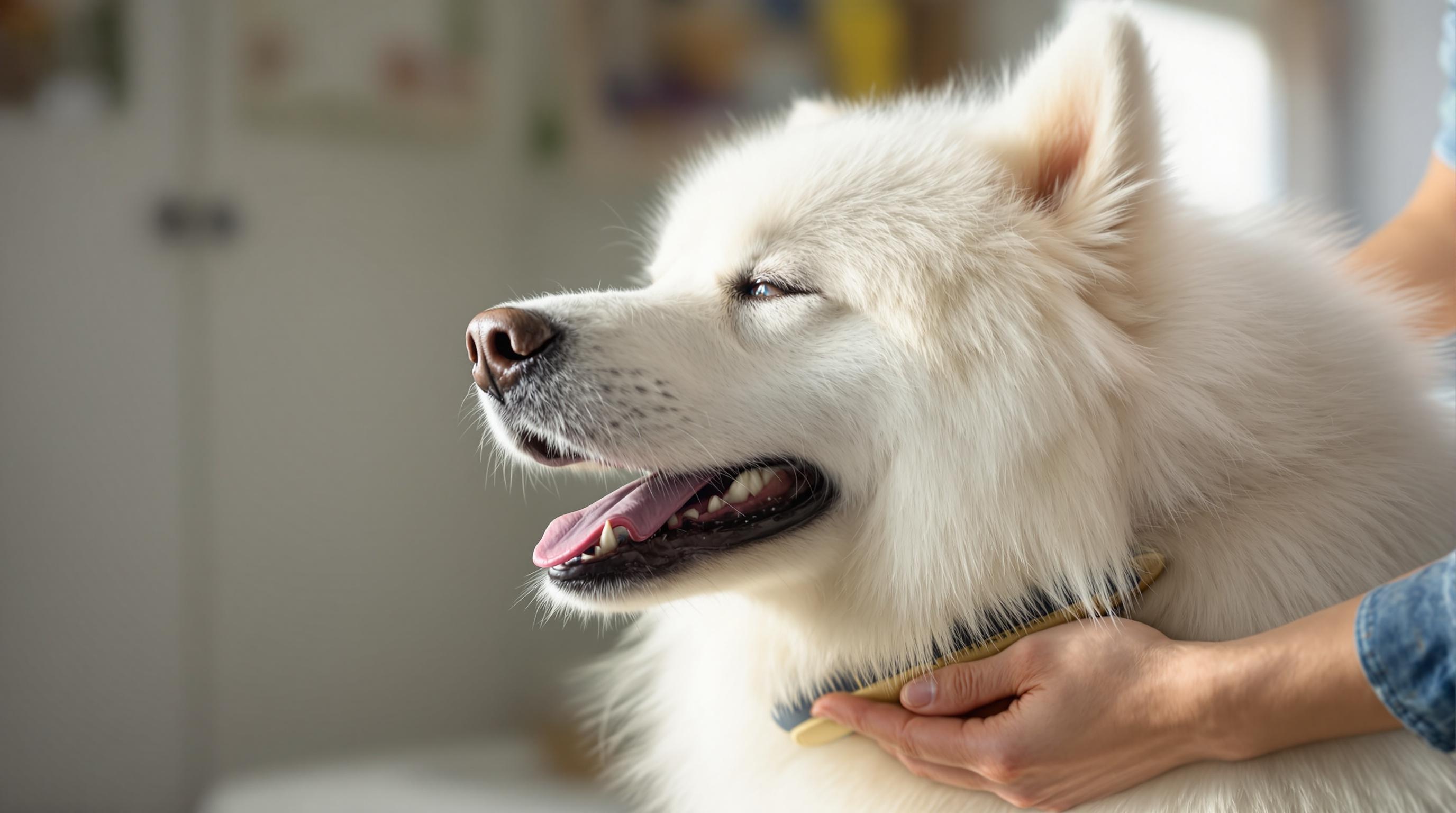The Samoyed, with its legendary smile and snowy coat, is one of the most beloved breeds among dog lovers! Originating from the cold regions of Siberia, this working dog is not only recognized for its beauty but also for its joyful personality and great intelligence.
Let’s explore together all the characteristics of this majestic breed, from its history to its training, including its specific needs in terms of health, behavior, and maintenance. You will also discover if this breed is right for you and your lifestyle.
Origins of the Samoyed #
The Samoyed is an ancient breed, whose origins trace back to Siberia, where it was raised by the Samoyeds, a nomadic people. These dogs were used for sled pulling, herding reindeer, and as hunting companions. The Samoyed thus has deep roots in extreme living conditions, which explains its robustness and ability to withstand very low temperatures.
Physical Characteristics of the Samoyed #
The Samoyed is a medium-sized dog, with a dense coat and an iconic smile. This section details its size, weight, coat color, and specific features that make it a unique dog.
Size and Weight #
| Characteristic | Males | Females |
|---|---|---|
| Size | 19-23.5 inches | 19-23.5 inches |
| Weight | 44-66 pounds | 35-55 pounds |
Coat Color #
The Samoyed is easily identifiable thanks to its snow-white coat, often shiny. It can also have ivory or cream shades, but pure white remains the dominant color.
Specific Features #
Due to its Siberian origin, the Samoyed has a double coat that protects it from extreme weather conditions. It is also known for its ability to smile, making it a very expressive and endearing dog.
Behavior of the Samoyed #
The Samoyed is an extremely sociable companion dog, but it also has unique behavioral characteristics that should be known before adopting one.
Behavior with Children #
The Samoyed is a gentle and patient dog, making it an excellent companion for families with children. Its calm and protective nature allows it to easily get along with the youngest.
Behavior with Other Animals #
We all know someone who is very sociable as soon as they go out and meet people. Well, if that were a dog, it would be the Samoyed! This breed is generally friendly with other animals, especially dogs and cats, especially if it has been well socialized from a young age.

Health of the Samoyed #
Life Expectancy #
The average life expectancy of a Samoyed is 12 to 14 years, although some individuals may live beyond this age with proper care.
Common Diseases #
The Samoyed is generally a robust dog, but like any breed, it can be prone to certain genetic diseases.
| Disease | Description | Frequency |
|---|---|---|
| Hip Dysplasia | A malformation of the hip joint that can cause pain and movement difficulties. | High |
| Progressive Retinal Atrophy (PRA) | A progressive degeneration of the retina, leading to vision loss. | Medium |
| Heart Problems ( heart murmurs) | Often benign, these murmurs can be a sign of underlying heart problems, requiring veterinary follow-up. | Medium |
| Skin Allergies | Allergic reactions affecting the skin, often due to specific environments or foods. | Medium |
| Hypothyroidism | An underactive thyroid gland, leading to symptoms like weight gain and lethargy. | Low |
Heart diseases are a real problem for dogs, of all breeds. And too often, they are diagnosed quite late because veterinary visits are spaced out. But today, there are preventive health devices that allow you to monitor your dog’s heart and respiratory health at home and daily.
Training the Samoyed #
The Samoyed is an intelligent dog, but it can sometimes be stubborn. It is essential to adopt positive training methods to make it a well-trained dog.
✔️ Positive Training Methods #
The Samoyed responds well to training methods based on reward and patience. Using treats and praise keeps it motivated.
✔️ Importance of Early Socialization #
From a young age, the Samoyed should be exposed to various people, animals, and environments to avoid shy or aggressive behaviors in adulthood. If done correctly and early, it will be the most sociable dog you know!

✔️ House Training #
House training can take some time, but it is essential to establish a regular routine and reward positive behaviors.
✔️ Teaching Basic Commands #
The Samoyed can easily learn basic commands such as “sit,” “stay,” and “come,” but it is important to practice regularly to reinforce its obedience.
❌ Managing Undesirable Behaviors #
The Samoyed is a dynamic dog, but it can sometimes develop undesirable behaviors, such as excessive barking, digging, or jumping on people. Here are some tips for managing these behaviors:
- Excessive Barking: The Samoyed tends to bark, especially if bored. It is important to provide enough physical and mental exercise to reduce this tendency. If barking becomes excessive, redirect its attention to a game or activity.
- Tendency to Dig: Some Samoyeds dig out of boredom or to attract attention. Ensure it has a stimulating environment, with games and regular walks. Consider creating a designated area where it can dig.
- Jumping on People: Although this may be an expression of joy, it is important to teach it not to jump on guests. Immediately remove attention when it jumps, and reward it when it remains calm.
Training Exercise Examples #
To ensure this very energetic dog expends energy and doesn’t get bored, it is advisable to diversify activities. For example, set up:
- Search games
- Agility sessions
- Walks on and off-leash
Character and Lifestyle of the Samoyed #
The Samoyed is an active dog that loves to participate in family activities. It is important to provide opportunities for it to expend energy, both physically and intellectually.
Physical Activity and Exercise #
The Samoyed is a breed that needs daily exercise to be happy. Long walks and play sessions will help it release its energy.
Indoor Character #
Indoors, the Samoyed can be a calm dog, but it also needs mental stimulation to avoid boredom. So don’t hesitate to buy it games, especially puzzle games. Note that it can sometimes be a bit noisy if bored, so watch out for your ears!
Character with Family and Other Animals #
The Samoyed is an excellent family dog, loving the company of children and other animals. It is particularly protective and loving with those it considers part of its family.
Living Environment #
The Samoyed can live in an apartment, but it much prefers an environment with a garden or outdoor space where it can run and play.
Grooming and Hygiene of the Samoyed #
The Samoyed has a magnificent coat that is its hallmark. But this also means it requires regular grooming to keep it healthy. In addition to the coat, it is also important to take care of the ears, eyes, and teeth.
Coat Grooming #
The Samoyed has a dense double coat that requires frequent brushing. It is recommended to brush it at least two to three times a week to prevent tangles and remove dead hair.
During the shedding period (in spring and fall), daily brushing is advised. Due to its double layer, the Samoyed loses a considerable amount of hair, which may require increased grooming.

Ear Care #
The Samoyed’s ears, which are large and floppy, should be checked regularly to avoid infections. It is advisable to clean them gently with a suitable product, especially if your dog spends time outdoors.
Eye Care #
The Samoyed can be prone to excessive tearing or eye infections. Regularly check the eyes for any irritation or redness. A gentle cleaning with a cotton swab may be necessary to prevent debris or dirt buildup.
Dental Care #
As with all dogs, it is important to maintain good dental hygiene in the Samoyed. Brushing the teeth two to three times a week and suitable chew toys can help prevent tartar buildup.
Diet #
The Samoyed should have a balanced diet, rich in high-quality proteins, to maintain its energy level and health. Premium quality kibble is often recommended.
Adoption and Cost of the Samoyed #
The adoption price of a Samoyed varies depending on pedigree, breeder, and region, but on average, adopting a Samoyed can cost between 1,000 and 2,500 €.
Annual Cost #
In addition to the adoption price, the annual costs to maintain a Samoyed can include veterinary care, food, grooming, and accessories. Count about 500 to 1,000 € per year.
The Samoyed is a perfect dog for active families and animal lovers. Its beauty, intelligence, and friendly nature make it an excellent choice for those looking for a loyal companion. If you are ready to provide it with the exercise and care it deserves, the Samoyed can be a wonderful addition to your life.

